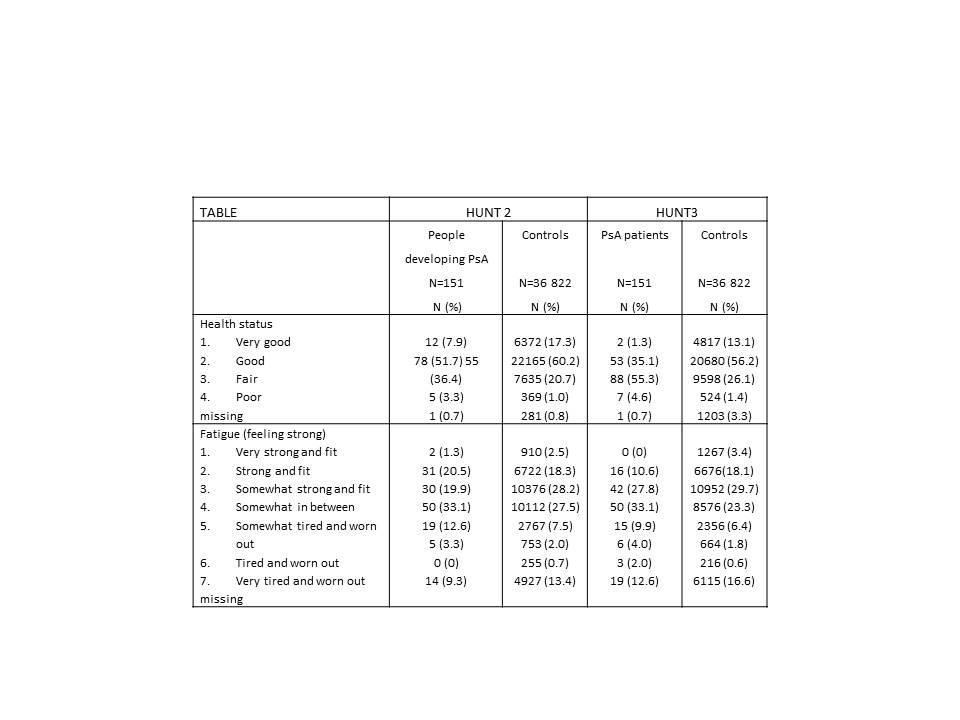Session Information
Session Type: ACR Poster Session C
Session Time: 9:00AM-11:00AM
Background/Purpose:
Psoriatic arthritis (PsA) is a systemic inflammatory disease that can involve skin, nails, joints, enthuses, and can be associated with systemic symptoms such as fatigue.
The disease may have a negative impact on patients, including their quality of life.
The aim of this study was to examine the effect of PsA on self-reported health status and fatigue.
Methods:
We present longitudinal data on 36 973 participants of the population-based HUNT Study, Norway (HUNT2, 1995-97 and HUNT3, 2006-08). Overall, 0.67% of participants in HUNT3 was validated to have PsA according to the Caspar criteria 1, and 151 were diagnosed with PsA between HUNT2 and HUNT3.
We examined health status and fatigue before and after the PsA diagnosis, compared with people without PsA, excluding persons diagnosed with PsA before HUNT2.
Self-reported health was measured as “How is your health at the moment (1: Very Good; 2: Good; 3: Fair 4: Poor)”. The question on fatigue was “Do you feel, for the most part, strong and fit or tired and worn out (graded from 1: Very strong and fit to 7: Very tired and worn out). Variables were also dichotomized to classify people as having poor health (response option 3-4) and fatigue (option 5-7).
We used linear regression to estimate adjusted mean differences in outcome variables at HUNT3, and logistic regression to estimate adjusted odds ratios (OR) for poor health and fatigue. All estimates were adjusted for baseline health or fatigue, gender, age, BMI, education, and smoking.
Sensitivity analyses were performed excluding people who reported poor health or fatigue in HUNT2.
Results:
There was no large differences at baseline in sex (57.6 vs. 55.2% women), age (43.9 vs. 46.8 years), BMI (27.3 vs. 26.2 kg/m2), or attainment of higher education (21.2% vs. 22.0%) between people developing PsA and those who did not. However, PsA developers smoked more (41.1 vs. 25.4%) and reported muscle and joint pain (66.9% vs. 46.5%).
Self-reported health status and fatigue before and after the PSA diagnosis are presented in Table. Compared to the controls, people developing PsA reported poorer health (30.5% vs. 23.3%) and more fatigue (31.8% vs. 19.4%).
After adjustment, they scored 0.37 (95% CI 0.28-0.47) higher on poor health and 0.40 (0.23-0.58) higher on fatigue compared to controls. Correspondingly, people developing PsA had an OR of 4.37 (2.95-6.46) for reporting poor health and 1.80 (1.22-2.65) for fatigue at HUNT3. The sensitivity analyses gave ORs of 3.72 (2.37-5.83) and 1.97 (1.31-2.96), respectively.
Conclusion:
Individuals who developed PsA were four times more likely to report poor health and the risk of perceived fatigue was almost doubled. This shows that developing PsA has a negative impact on patients and could contribute to an impaired quality of life in these patients.
1. Hoff M et al. Prevalence and incidence rates of PsA in central Norway: data from the HUNT study. ARD. Aug 20 2013.
To cite this abstract in AMA style:
Hoff M, Nilsen TIL, Thomsen RS, Gulati AM, Kavanaugh A, Haugeberg G. Change in Self-Reported Health Status and Fatigue before and after the Diagnosis of Psoriatic Arthritis- the Nord-Trondelag Health Study (HUNT) [abstract]. Arthritis Rheumatol. 2017; 69 (suppl 10). https://acrabstracts.org/abstract/change-in-self-reported-health-status-and-fatigue-before-and-after-the-diagnosis-of-psoriatic-arthritis-the-nord-trondelag-health-study-hunt/. Accessed .« Back to 2017 ACR/ARHP Annual Meeting
ACR Meeting Abstracts - https://acrabstracts.org/abstract/change-in-self-reported-health-status-and-fatigue-before-and-after-the-diagnosis-of-psoriatic-arthritis-the-nord-trondelag-health-study-hunt/

